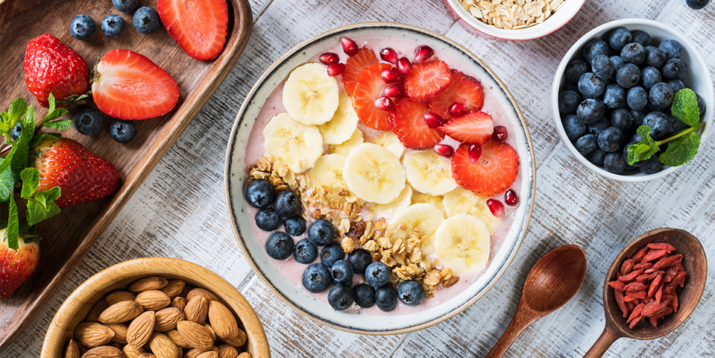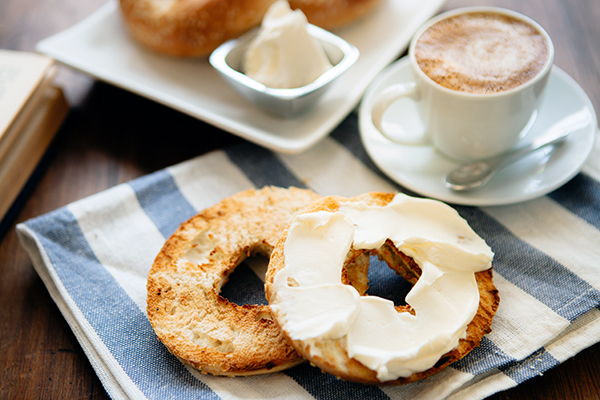Why Breakfast Is So Important — but Only If You Do It Right

Did you know that the old bromide of breakfast being “the most important meal of the day” was actually coined by the Kellogg’s brand as a way to sell more cereal? Marketing ploys aside, they weren’t far from the truth. But why is breakfast so important?
A growing body of research shows that what you eat when you wake up could greatly impact the course of your entire day. If you want to wake up, feel energized, and take on your morning, coffee can help you get out the door, but it’s a balanced breakfast that will set you up for the rest of the day.
Breakfast — and specifically, what’s in it — is critical to curb hunger, reduce food cravings, and maintain better blood sugar control to prevent those “hangry” feelings throughout the day, according to researcher Heather Leidy, Ph.D., associate professor of nutritional sciences and pediatrics at the University of Texas, Austin, who studies the impact of meal-timing on the body.
And, it turns out, most people are doing breakfast all wrong. Ahead, the impressive benefits of breakfast, what a balanced, healthy breakfast looks like, plus, what recent studies downplaying the importance of breakfast are missing.
5 Benefits of a Balanced Breakfast

Research shows that a quality breakfast comes with a host of benefits:
1. Weight management
If you’re trying to lose or maintain weight, skipping breakfast may actually work against your goals. Nutritious, high-protein breakfasts have been shown to reduce evening snacking (particularly of high-fat foods), promote satiety, and reduce overall food intake, all of which can help you consume fewer calories and make better food choices throughout the day.
2. Increased energy
The energy-boosting benefits of breakfast are in its namesake: You’re breaking the eight(ish)-hour fast that occurs during sleep and replenishing your body’s blood sugar levels. According to Harvard Medical School, when you don’t resupply your brain and body with fuel in the morning, you may dip into your energy reserves, which can affect your energy level the rest of your day.
Moreover, this study found that low-glycemic and high-protein breakfasts were associated with higher energy (in part by helping to balance blood sugar levels) than less nutrient-dense breakfasts.
3. Improved diet quality
Eating breakfast generally leads to higher intakes of key nutrients, which contributes to a better overall diet quality. For example, this analysis of a National Health and Examination Survey reports that while breakfast accounted for 20 percent of daily calorie intake, it provided substantially more than 20 percent of daily intake for important micronutrients, such as magnesium, zinc, calcium, iron, and vitamins A, C and D, and B vitamins.
4. Better mood
If you’re prone to getting hangry or know someone who is, you’re well aware of the acute impact that hunger can have on your state of mind. However, what you eat can have as much impact as whether you eat.
A study of Spanish adolescents found that those who ate a high-quality breakfast showed higher health-related quality of life (HRQOL) and lower levels of perceived stress and depressive mood than those who consumed a poor-quality breakfast. However, it also found that having no breakfast at all led to higher HRQOL and lower perceived stress levels compared to a poor-quality breakfast.
5. Enhanced cognitive performance
Ever feel like your brain’s not firing on all cylinders when you skip a meal? It’s no coincidence. In a study of adolescent participants that measured performance across several cognitive tests, participants who ate breakfast showed better scores in most tests than those who didn’t.
And those who ate a higher-quality breakfast demonstrated better performance in some tests than those who consumed a lower-quality breakfast.
To reap the benefits of breakfast, however, quality is key, Leidy says. And most people aren’t getting the optimal amount of nutrients to help them power through the day, she explains.
What Is a Healthy Breakfast?

A healthy breakfast is one that’s balanced, nutrient-dense, high in protein and fiber, and isn’t loaded with added sugar.
According to Krista Maguire, R.D., “A high-protein, high-fiber breakfast helps maintain healthy blood sugar levels and provides a steady stream of energy, which can keep hunger at bay and prevent those mid-morning or mid-afternoon energy slumps.”
And Leidy agrees: “Eating a high-protein breakfast allows you to adhere to a healthier diet and helps you make better food choices throughout the day.”
Here are some foods Maguire recommends to mix and match to compose a healthy, balanced breakfast:
High protein
- Cottage cheese
- Unsweetened Greek yogurt
- Eggs
- Organic tofu or tempeh
High fiber
- Oats
- Whole grains (quinoa, whole grain toast or English muffin, etc.)
- Fresh fruit (raspberries, mango, apples, etc.)
Nutrient dense
- Green veggies (spinach, asparagus, broccoli, etc.)
- Nut butter (peanut butter, almond butter, sunflower seed butter)
- Beans and lentils

It’s not that most people want to eat a bad breakfast. A lot of us are simply too time-strapped to really think about what we’re going to eat to fuel our mornings, and instead rely on convenience. And in fact, people are seeking out healthier, protein-rich options — as long as they’re quick and portable.
Unfortunately, many grab-and-go breakfast options don’t contain all the fiber, protein, and other nutrients you’d be getting in an ideal, sit-down scenario. Or, they’re surprisingly high in added sugar.
Related: 4 Common Breakfast Mistakes and What to Eat Instead
That’s one of the reasons why Shakeology was born. It’s a convenient, nutrient-dense, and protein-rich way to start your day. High in protein and fiber, but not in added sugar, Shakeology can be a delicious and easy way to add these nutrients and more to a balanced breakfast.
It has potent superfoods and botanicals, provides healthy energy, and is a nutrient-dense way to start your day. When you drink Shakeology each morning as part of a healthy breakfast, you’re setting yourself up for success for the rest of the day.
For inspiration on how to whip up the perfect shake to start your day in no time flat, check out these tasty Shakeology recipes.
What Not to Eat for Breakfast

A 2018 study shows that nearly one in five Americans regularly skips breakfast. And adults who do eat breakfast aren’t choosing the type of high-protein breakfast that helps promote better eating habits. Rather than a high-protein breakfast, a high proportion of calories goes to carbohydrates and sugar.
“People are still eating a lot of sugar in the morning, and people are getting a lot of sugar from so-called healthy breakfasts,” explains Leidy.
And according to Maguire, eating a breakfast full of sugar or refined carbohydrates is a surefire way to run out of steam quickly.
“Starting your morning with simple carbs like sugary cereal, muffins, donuts, or other baked goods sets you up for a vicious cycle of energy highs and lows,” she says.
And when energy levels crash, your body can react with cravings for more sugary foods, explains Maguire, setting off a cycle of slumps and snacking.
Why Do Some Studies Say Breakfast Doesn’t Matter?
Instead of the most important, breakfast might now be considered the most contentious meal of the day.
In the past few years, a handful of studies have come out saying that breakfast is optional at best, and one suggested breakfast may even hurt weight loss efforts.
According to Leidy, who has read almost every study that’s been done on breakfast, these studies have a major flaw: They don’t take into account the quality of people’s breakfasts or assess what they were eating.
In other words, doughnuts, muffins, and other sugary options are lumped together with healthier breakfast foods.
If you’re comparing cereal and juice or a bear claw to skipping breakfast, you won’t see any overall health benefits of eating breakfast versus not.
Related: Do You Really Need to Eat Breakfast to Lose Weight?
“Over the past five years, there have been several articles concluding that breakfast doesn’t matter. But if you read those studies, the authors clearly state that they didn’t assess macronutrient content or breakfast quality,” explains Leidy. “While we cannot say that breakfast, in general, is beneficial, we can support that eating a nutritious breakfast is extremely beneficial.”
“When you actually start looking at the quality of the breakfast, you see that a higher-protein breakfast helps prevent food cravings and decreases hunger. And that those people eat fewer snacks and sweets, especially later in the day,” she adds.
Related: 6 Habits of People Who Successfully Maintain Weight Loss
And in fact, research shows that among people who lose a significant amount of weight and keep it off, 78 percent eat breakfast every day.

